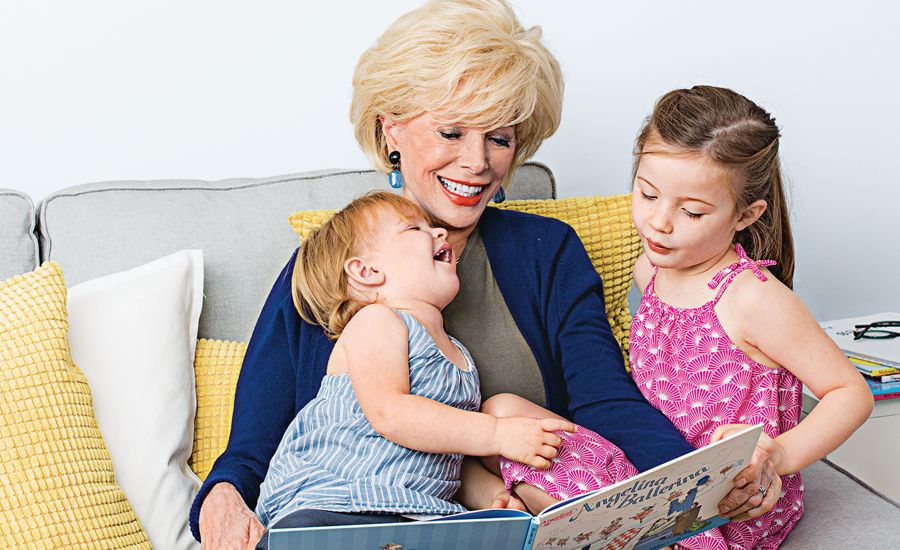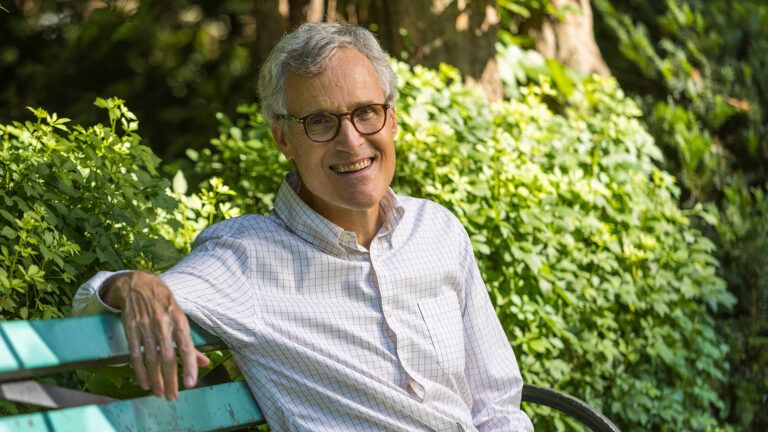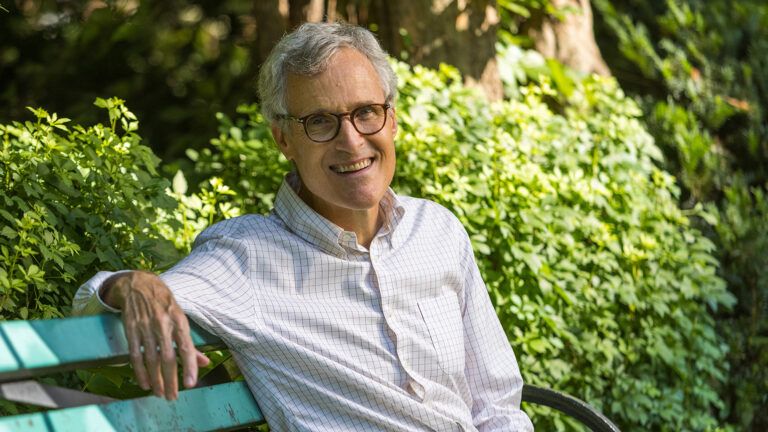My 93-year-old mother was in the hospital in Massachusetts. She was not doing well—her cancer had metastasized and she was weak and tired. Fading, I feared. I was visiting her when I got the call from my daughter, Taylor, who lives in Los Angeles.
Her contractions had started. My first grandchild was on the way! I kissed my mom goodbye, promising that I would be back soon, and booked the next flight to L.A. for my husband, Aaron, and myself.
I’ve always thought of myself as having enormous self-control. I can hold it together in any situation. That’s what I do in my career as a television journalist. I’ve reported from war zones and challenged heads of state. I have to listen to heart-wrenching stories and remain composed. Not now. My mother was dying, my only child going into labor; I was a wreck.
I usually enjoy flights and use the time to read a pile of books. This time I did nothing but worry all the way to Los Angeles. I thought of Taylor and our son-in-law, Andrew, and then my mom—Dolly, as we all called her.
Would she be okay until I got back? Was it time to arrange for hospice care? What about the baby in California? Would Taylor be up to it? Would I? For months I’d been pushing away those grandma gremlins.
Aaron and I landed at LAX. We got to the hospital and saw Taylor in the birthing room, calm as ever. Then we were banished to the waiting room, where we paced and checked our watches.
We knew it was going to be a girl. They’d already picked the name, Jordan. I’d gone with Taylor to doctor’s appointments. I’d heard the baby’s heartbeat and seen her little arms and legs floating on the ultrasound screen.
Forty minutes later—it felt like hours—the doctor appeared. The baby was perfect, healthy, the mother fine. We rushed back to see Jordan swaddled in Taylor’s arms. I was so pumped my heart was on a trampoline. All I wanted to do was hold Jordan.
Finally my chance came. I nearly swooned, overwhelmed with euphoria. I had assumed I’d already had my best days, my highest highs. Now I was experiencing something new, a whole new kind of love.
I was a grandmother.
My mother and I had a complicated relationship. No secret to anyone who knows us. But she was the best grandmother. The way she grandmothered had zero relationship to the way she had mothered me. Would the same be said of me?
READ MORE: SAVANNAH GUTHRIE ON HOLDING FAST TO FAITH
When Taylor was young, I was a White House correspondent with assignments that took me away for days at a time. I missed so many milestones. Aaron is a writer and worked at home. He was there for our daughter. But with Jordan I was determined not to miss a thing. We get to reboot with our grandkids, fix the mistakes or make amends for what we did as parents.
Of course, our grandchildren force us to confront our age. As the old joke goes, “My grandkids believe I’m the oldest thing in the world. And after two or three hours with them, I believe it.” It didn’t stop me from booking as many assignments in California as I could.
The first time Aaron and I babysat Jordan, giving the kids a night out, I don’t think I ever prayed so hard. We had all our instructions and were prepared to follow them to the letter. But Jordan wouldn’t take her bottle and bawled. Even then I was head over heels in love with her.
When we’re children, our feelings are selfish. During parenthood, we’re burdened with responsibility and fear (not to mention lack of sleep). Grandparents’ love is unfettered, pure. With Jordan in my arms I was filled with something very rare for me, total peace. Especially when she stopped crying.
The balance shifts when our children become parents. We grands begin holding our tongues (we try, anyway). We live by their rules now. And rule number one is: Do it their way.
One evening we were with Taylor and Andrew and they were instituting sleep-through-the-night training. At all of five months Jordan was being initiated into a new routine: bath, nursing and then into her crib to fall asleep on her own. “She has to learn she can do it, Mom,” Taylor said, reading the look of consternation on my face.
The four of us sat in the living room, listening to the baby monitor, hearing Jordan scream her little head off. Taylor and Andrew would go in occasionally and say, “We love you,” but never picked her up. It was excruciating. I couldn’t bear it. But I was so good. I didn’t say a word…or at least I thought I didn’t.
“I was the Sphinx,” I said to Aaron back in the car.
“No way,” Aaron said. “You were constantly on their case. You kept saying, ‘We never did this and you turned out all right.’” So much for my best intentions. And my self-control.
Really, though, as a grandparent, you’re willing to do anything as long as you can be with the grandkids. I know one woman whose daughter-in-law insists that she change her clothes before she holds her grandbaby. “I would wear a hazmat suit if I had to,” she says, laughing.
Summertime is the best. We take a month’s vacation and rent a place by the beach where the kids can join us. When Jordan was six months old I got to play with her every day for four weeks. She chewed on my fingers, grabbed my earrings, my glasses, my necklace. She put her fingers in my mouth and I’d suck on them as if they were straws.
After an hour I’d pray she would fall asleep now…though I had far more patience with Jordan than I ever did when Taylor was an infant.
They say once you’re over 60 you don’t know beans about technology. But we grandparents have a mighty strong incentive to learn. Even if the baby lives far away, we can still share the big moments onscreen—first step, first words, first bike ride, first ballet twirl, first haircut. “Just call me Grandma iPad,” says one woman.
When grandchildren are older, it’s the grandparents who pass along the family heritage. My friend Alice Greenwald used to run the Holocaust Memorial Museum in Washington, D.C.
“Most survivors of the concentration camps never talked to their children about what had happened to them,” she said. But they told their grandchildren because they wanted the story to be passed on to the next generation.
My parents weren’t very observant religiously, but I learned much about my Jewish faith from my grandfather. He was deeply religious. We celebrated the holidays with him.
The relationship between grandparents and grandkids is good for the kids, but it’s also therapeutic for us. For several years Aaron has been struggling with Parkinson’s, walking stiffly and slowly, a tremor in his hands (something that actually soothed Jordan when he held her).
The doctor put him on dopamine pills, which gave him a facial tic. One day five months after Jordan was born, I noticed that the tic was gone.
“What happened?” I asked.
“I’ve taken myself off dopamine,” Aaron said.
“You can’t!” I said. But he could and did for a time. Gone was the Parkinsonian mask that froze his smile. He even started driving again. It felt like a miracle, the flutter of angels’ wings in the air. The symptoms eventually came back, but for a time they were gone and we were grateful.
None of the specialists could give us a straight answer. My own theory was that becoming a grandfather was healing.
Those first weeks of Jordan’s life, if I wasn’t in L.A. or working in New York, I was in Massachusetts, helping Dolly. We moved her back home and arranged for around-the-clock palliative care. When Jordan was five weeks old, Taylor and Andrew brought her East to introduce Dolly to her greatgranddaughter.
It was the answer to all our prayers. I thought maybe my mother was holding on, willing herself not to go until she met Jordan. Perhaps that was it. A few days later she died, very peacefully, her death colliding in me with the freshness of Jordan’s new life, the wonder of it.
Aaron, who was raised a Methodist, always says there’s a plan to the universe, there’s a higher order. Grandchildren come along and they send you in a direction you never dreamed you were going. You discover a new purpose, a new calling.
We now have two grandchildren, Chloe having arrived two years after her sister. Holding her, I was flooded with the same love, the same charge I felt with Jordan. And nobody could convince me that she wasn’t drop-dead beautiful.
This role of grandmother inspired me to write a book, Becoming Grandma, asking all sorts of experts about “the joys and science of the new grandparenting,” as the book’s subtitle puts it. Of all the interviews, one conversation stands out. It was with a psychiatrist named Nancy Davis, of Bradenton, Florida.
There is one question she always asks her patients: “Who loved you?” “If nobody loved you in your first five or six years, you’re in trouble,” she said. “It’s like you can’t know what love is unless somebody loved you during that time.”
“Is it enough if the answer is, ‘My grandmother loved me’?” I asked.
“It’s enough,” she said.
Steve Leber, the CEO of grandparents .com, told me, “God gave us grandchildren to make up for aging.”
Ain’t it the truth.
Did you enjoy this story? Subscribe to Guideposts magazine.






